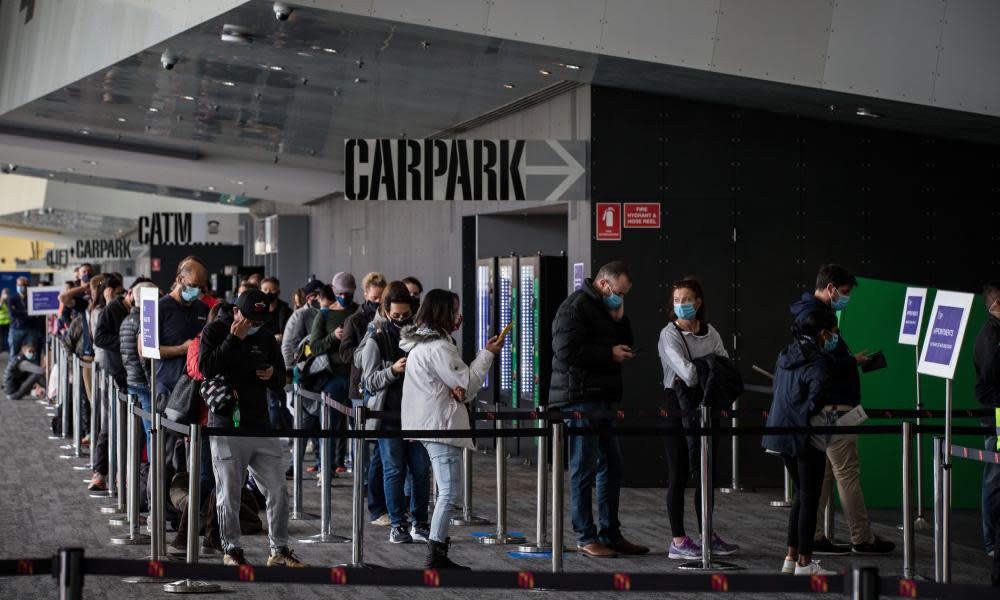As an Australian I’m lucky that I got my first jab. I’m confounded why luck had to come into it

I got my coronavirus vaccine last week. I celebrated at a favourite burger joint, slurping a milkshake as big as my head and dancing around the table to Daft Punk, even as news broke that an outbreak in my home state of Victoria foreshadowed another lockdown. Even as my needled arm began to gently throb.
Missing a childhood measles vaccine almost killed me; it’s now unlikely coronavirus will have that chance. I woke up the next day with a warned-of hazy brain, a little nausea and a strong feeling I may need to gnaw my aching arm from a bear trap. Mostly, however, I felt relieved – as if the one decision I made to try my luck with eligibility, book an appointment and hop to the pop-up clinic at my local Mercure has negated a lifetime of more – ahem – questionable self-care choices.
As an Australian, I’m lucky that I got my jab. I’m also confounded why luck had to come into it.
Australia is a prosperous western nation with a cohesive public healthcare system, but the Morrison Liberal government has spectacularly mismanaged the vaccine rollout, blaming supply shortages and relying on a “hermit kingdom” shut-border containment policy.
Now the virus is spreading again and a local firewall of vaccinations that may limit spread of this devastating “Indian strain” isn’t built. So the political rhetoric has switched and citizens are now copping the blame for under-vaccination, government MPs deployed to fault us for our own “vaccine hesitancy”.
“Vaccine hesitancy” is a term the World Health Organization uses to describe why people don’t get vaccinations when vaccines are available. In Australia, we sometimes hear about it as a potential effect of aggressive anti-vaccination campaigns. The idea is that the problematising of vaccination dissuades other people from participating in it.
Vaccine hesitancy, though, is complex and context-specific. Dropping a term with strong anti-vaxx associations into the discourse around Australia’s low coronavirus vaccination rate is a sly bait-and-switch that demonises victims of the vaccination rollout failure in lieu of addressing it.
Australians are overwhelmingly predisposed to embracing public health measures, without complaint
Yes, pandemic-related distress has certainly seduced increasing numbers of Australians into conspiracist beliefs – like anti-vaxxism – but these beliefs still remain marginal to the majority. Yes, there have been aggressive attempts from hard-right agitators to insist coronavirus is a hoax (it isn’t) and that vaccines are a scam (they aren’t) and something-something-government-overreach-don’t-tread-on-me (whatever). A couple of hundred people marching against lockdowns in Melbourne last week is still only a couple of hundred people in a city of 5 million and numbers are not growing from last year.
If you’re still seeing anti-vaxx material online, it’s not because of a mass movement behind it. It might just be the online Russian-influence operations which have been sprung pushing such messages in the past.
The reality is that Australians are overwhelmingly predisposed to embracing public health measures without complaint. Dr Aaron Martin from the University of Melbourne describes mainstream Australia more accurately as a “pragmatic” community, not bound to historical rebellious individualism that dogs American attitudes. Monash’s Prof Graeme Davison also argues that Australians habitually and consistently appreciate collective measures for public safety. His evidence? Seatbelts, breathalysers … oh, and our recently demonstrated mass compliance with mask mandates and lockdown directives.
There’s further proof: 6,000 Victorians got vaccinated two weeks ago, but in the wake of the new outbreak, 15,000 Victorians were jabbed in a single day.
That doesn’t sound like “hesitancy”. It sounds like they may have had the pure good luck that I did to hear Victoria’s acting premier James Merlino announce there’s “no problem” with the state’s vaccine supply.
Alas, within the Morrison government’s relentless vaccination mess lies a staggering confusion of messages, despite a whopping $40m spent on an ad campaign. Significant numbers of vaccine-eligible Australians don’t know they’re eligible or that the vaccines are now in plentiful supply.
We do know people who’ve fronted clinics, been deemed ineligible and turned away, though. We know some deemed eligible can’t access the vaccine. We know “prioritised” aged care and disability sectors whose uneven vaccine supplies have alternatively delivered no doses or “abject failure”.
Into this information morass stumbled the government’s hopeless PR mishandling of a scare campaign about a six-in-a-million blood clot risk from the AstraZeneca vaccine that overshadowed the coronavirus’s 20,000-in-a-million fatality rate.
Is Australia really in the grip of “vaccine hesitancy” or is the national affliction “government vaccine failure, leading to total confusion”?
I nurse my aching arm and the hard lump under the skin and consider that getting a coronavirus vaccine shouldn’t be a matter of luck. It should be the most base expectation of government competence, in a pragmatic, collective commitment to protecting Australia.

 Yahoo News
Yahoo News 
